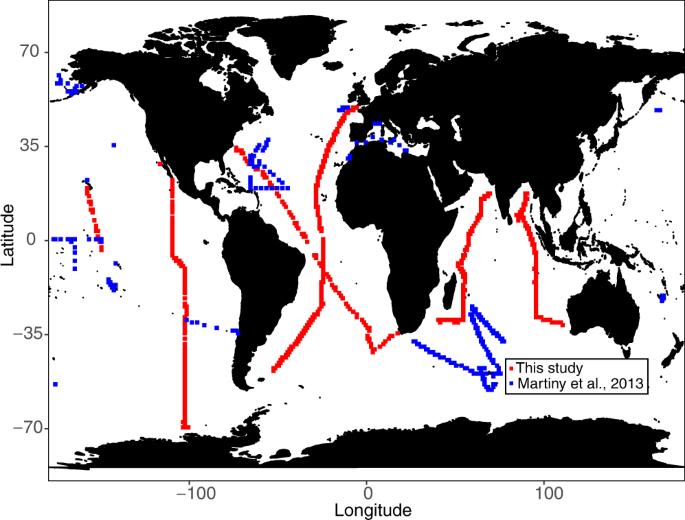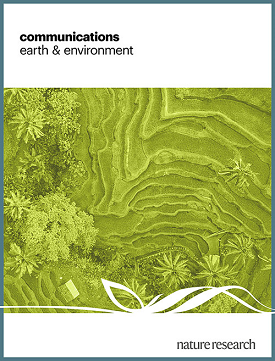Global patterns and predictors of C:N:P in marine ecosystems
IF 8.1
1区 地球科学
Q1 ENVIRONMENTAL SCIENCES
引用次数: 8
Abstract
Oceanic nutrient cycles are coupled, yet carbon-nitrogen-phosphorus (C:N:P) stoichiometry in marine ecosystems is variable through space and time, with no clear consensus on the controls on variability. Here, we analyze hydrographic, plankton genomic diversity, and particulate organic matter data from 1970 stations sampled during a global ocean observation program (Bio-GO-SHIP) to investigate the biogeography of surface ocean particulate organic matter stoichiometry. We find latitudinal variability in C:N:P stoichiometry, with surface temperature and macronutrient availability as strong predictors of stoichiometry at high latitudes. Genomic observations indicated community nutrient stress and suggested that nutrient supply rate and nitrogen-versus-phosphorus stress are predictive of hemispheric and regional variations in stoichiometry. Our data-derived statistical model suggests that C:P and N:P ratios will increase at high latitudes in the future, however, changes at low latitudes are uncertain. Our findings suggest systematic regulation of elemental stoichiometry among ocean ecosystems, but that future changes remain highly uncertain. Variations in the biogeography of particulate organic matter carbon-nitrogen-phosphorus stoichiometry in the surface ocean can be robustly predicted by different factors depending on latitude, region and hemisphere, according to a global ocean observational analysis.

海洋生态系统中 C:N:P 的全球模式和预测因素
海洋养分循环是耦合的,但海洋生态系统中的碳-氮-磷(C:N:P)化学计量在空间和时间上是可变的,而对可变性的控制却没有明确的共识。在此,我们分析了在全球海洋观测计划(Bio-GO-SHIP)中采样的 1970 个站点的水文地理学、浮游生物基因组多样性和颗粒有机物数据,以研究表层海洋颗粒有机物化学计量的生物地理学。我们发现,C:N:P 的化学计量存在纬度变异,高纬度地区的地表温度和大量营养物质的可获得性对化学计量有很强的预测作用。基因组观测结果表明群落存在营养压力,并表明营养供应率和氮磷压力可预测半球和区域的化学计量变化。我们的数据统计模型表明,未来高纬度地区的碳:磷和氮:磷比例将增加,但低纬度地区的变化还不确定。我们的研究结果表明,海洋生态系统之间的元素化学计量具有系统性调节作用,但未来的变化仍具有很大的不确定性。全球海洋观测分析表明,不同纬度、地区和半球的不同因素可以有力地预测表层海洋颗粒有机物碳氮磷比例的生物地理学变化。
本文章由计算机程序翻译,如有差异,请以英文原文为准。
求助全文
约1分钟内获得全文
求助全文
来源期刊

Communications Earth & Environment
Earth and Planetary Sciences-General Earth and Planetary Sciences
CiteScore
8.60
自引率
2.50%
发文量
269
审稿时长
26 weeks
期刊介绍:
Communications Earth & Environment is an open access journal from Nature Portfolio publishing high-quality research, reviews and commentary in all areas of the Earth, environmental and planetary sciences. Research papers published by the journal represent significant advances that bring new insight to a specialized area in Earth science, planetary science or environmental science.
Communications Earth & Environment has a 2-year impact factor of 7.9 (2022 Journal Citation Reports®). Articles published in the journal in 2022 were downloaded 1,412,858 times. Median time from submission to the first editorial decision is 8 days.
 求助内容:
求助内容: 应助结果提醒方式:
应助结果提醒方式:


